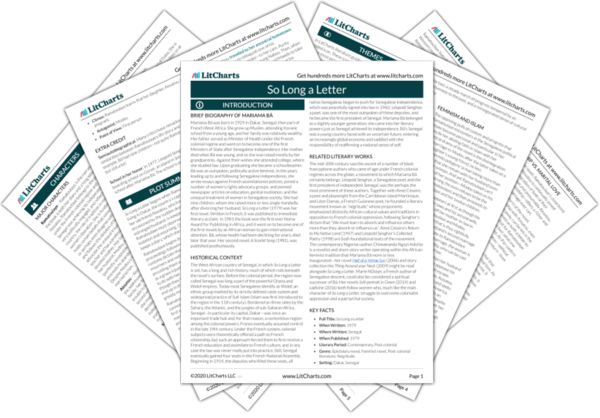So Long a Letter is formally unusual. It is at once an epistolary novel—a novel composed of letters—and a diary. Ramatoulaye, writing during the 40 days of mourning she must observe in the wake of her husband’s death, addresses her reflections to her best friend Aissatou. And yet we never get to read Aissatou’s response. The book has the quality of a dialogue in the sense that the writing is interpersonal, addressed to another mind, but the dialogue is ultimately one sided.
Consequently, the reader comes to stand in for Aissatou, and becomes the addressee of Ramatoulaye’s musings. Indeed, much of what Ramatoulaye writes seems written for the reader’s sake, as so many of the details she recounts, Aissatou already knows. In this way, So Long a Letter is framed as an ongoing conversation—a conversation that may extend into the future—in which the reader is included and perhaps even encouraged to respond.
The theme of dialogue is manifested not just in the form of the novel, but also in its plot. For one, Modou’s abandonment of Ramatoulaye and her children is framed as a complete breakdown of communication and dialogue. Rather than confront Ramatoulaye directly about his decision to marry a new woman, he sends his brother to break the news to her. Ramatoulaye, feeling the burden of etiquette and custom, cannot respond to her husband’s messengers in the way she wants. The breakup of Aissatou’s marriage unfolds in a similar manner—Aissatou is left completely out of the loop when it comes to Aunty Nabou’s scheming to replace her. In contrast, Ramatoulaye’s arguably greatest moment of triumph occurs when she finds the strength to speak freely and without inhibition with Tamsir after he crassly proposes to her following Modou’s death. Finally, Ramatoulaye’s extended conversation with Daoude over the role of women in government introduces a political dimension to the theme of dialogue. The exchange demonstrates that dialogue is an important catalyst for political progress, and in fact constitutes the very foundation of democracy.
At last, it seems that the ambiguities and contradictions Ramatoulaye grapples with in trying to reconcile her feminism with her faith, her political beliefs with her personal life, are really the beginnings of an ongoing conversation—a conversation in which the reader is included, and on which the future of Senegal depends.
Dialogue and Address ThemeTracker

Dialogue and Address Quotes in So Long a Letter
Combining your despair you could have been avengers and made them tremble, all those who are drunk on their wealth; tremble, those upon whom fate has bestowed favours. A horde powerful in its repugnance and revolt, you could have snatched the bread that your hunger craves.
Your stoicism has made you not violent or subversive but true heroes, unknown in the mainstream of history, never upsetting established order, despite your miserable condition.

Unlock explanations and citation info for this and every other So Long a Letter quote.
Plus so much more...
Get LitCharts A+Eternal questions of our eternal debates. We all agreed that much dismantling was needed to introduce modernity within our traditions. Torn between the past and the present, we deplored the 'hard sweat' that would be inevitable. We counted the possible losses. But we knew that nothing would be as before. We were full of nostalgia but were resolutely progressive.
Friendship has splendours that love knows not. It grows stronger when crossed, whereas obstacles kill love. Friendship resists time, which wearies and severs couples. It has heights unknown to love.
Even though I understand your stand, even though I respect the choice of liberated women, I have never conceived of happiness outside marriage.
Daouda Dieng was savouring the warmth of the inner dream he was spinning around me. As for me, I was bolting like a horse that has long been tethered and is now free and revelling in space. Ah, the joy of having an interlocutor before you, especially an admirer!
When we meet, the signs on our bodies will not be important. The essential thing is the content of our hearts, which animates us; the essential thing is the quality of the sap that flows through us. You have often proved to me the superiority of friendship over love. Time, distance, as well as mutual memories have consolidated our ties and made our children brothers and sisters. Reunited, will we draw up a detailed account of our faded bloom, or will we sow new seeds for new harvests?
‘Marriage is no chain. It is mutual agreement over a life's programme. So if one of the partners is no longer satisfied with the union, why should he remain? It may be Abou [her husband]; it may be me. Why not? The wife can take the initiative to make the break.’











